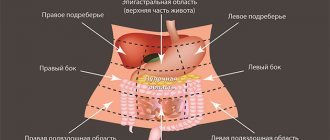The modern rhythm of life, quick snacks in fast foods, frequent worries and stress cannot but affect health. One of the common ailments is discomfort and heaviness in the stomach.
Heaviness in the stomach is a state of functional disturbance of the gastrointestinal tract due to current or chronic diseases, as well as in the event of a poor diet.
As a rule, a person suffers from heaviness in the stomach, feeling the following consequences:
- physical activity is limited;
- there is a feeling of difficulty in performing daily activities.
In general, it is already difficult to follow the usual way of life. If heaviness in the stomach, bloating, belching, pain, vomiting, constipation and other characteristic sensations periodically bother a person, it is necessary to undergo various examinations by a gastroenterologist and follow his recommendations. In other cases, you need to understand the reasons related to your current diet and lifestyle.
Heaviness in the stomach: causes.
Heaviness in the abdomen occurs for various reasons - from intolerance to a certain product to serious diseases of the gastrointestinal tract. Let us note the most common situations that lead to heaviness in the abdomen:
- Metabolic disorders: any degree of obesity and diabetes lead to heaviness in the stomach.
- Side effects due to taking medications can lead to symptoms such as heaviness in the stomach and nausea, pain, vomiting, constipation. The characteristic symptoms disappear; you just need to stop taking the medications.
- Diseases of the digestive system - if a person suffers from cirrhosis, gastric ulcer, hepatitis, cholelithiasis, gastritis, cholecystitis. Any diagnosis can lead to heaviness, pain, constipation and other discomfort in the abdomen.
- Wrong diet - heaviness in the stomach occurs with excessive consumption of spicy, salty, fatty foods. In such cases, you feel heaviness in the stomach, it’s hard to breathe, and pain occurs. Also, a failure of the diet leads to disturbances in the gastrointestinal tract, especially when a person takes food rarely and in large portions.
- Stressful conditions - prolonged stress, anxiety and other negative circumstances lead to various disorders of the digestive system, regardless of food. Heaviness in the abdomen, pain, vomiting, constipation and other characteristic sensations arise due to the direct influence of the nervous system on peristalsis. Therefore, the food eaten during a stressful day is not fully digested and discomfort in the stomach occurs. You should take care of your psychological state and consult a doctor.
- Bad habits - smoking, excessive consumption of alcohol, coffee, sugary drinks (especially carbonated drinks) can cause nausea, pain, constipation, and heaviness in the stomach.
- Food intolerance. The most common characteristic condition of the body: the inability to digest lactose, which causes heaviness in the stomach after meals prepared with milk and dairy products. The symptom usually affects children, it goes away by the age of 4-5 and the diet should be brought back to normal (with food containing milk). Only 10% of patients progress to the disease into adulthood.
- Food allergy is a congenital disease that manifests itself as a negative reaction of the digestive system to the consumption of certain foods. In addition to heaviness in the stomach, food with an allergen leads to various other symptoms in a person: skin rash, nausea, general weakness, runny nose, dry cough.
We should not forget about the influence of parasites on the functioning of the gastrointestinal tract as a whole. They are characterized by the ability to live in our body for a long time almost asymptomatically, only sometimes heaviness in the stomach appears. The most common cause of heaviness in the abdomen is worms, which enter the body due to insufficient hygiene on the part of a person.
In this case, children should be taught to wash their hands more often, and if there are pets (cats, dogs) in the house, the animals should be given anthelmintic therapy at least once a year.
Causes of heaviness and cramps in the stomach
This condition can occur at any time of the day. The main causes of heaviness in the stomach after eating are eating disorders:
- Irregular eating. The norm is to take small portions 4-6 times a day.
- Snacking on the spot, dry food, or replacing full-fledged hot meals with semi-finished products and fast food can cause stomach pain after eating. Incompatible or poorly digestible foods containing large amounts of fat or hot spices greatly irritate the stomach.
- Overeating, especially before bed. Gastric juice does not have time to process a large amount of food, and part of it is sent to the duodenum undigested.
Unnatural sensations in the stomach in the morning occur due to various reasons, including:
- taking medications that affect the functionality of the gastrointestinal tract;
- disruption of the functioning of certain organs (liver, stomach, pancreas);
- bad habits – alcohol, smoking;
- uncontrolled consumption of sweet carbonated drinks;
- stressful situations.
A separate group includes diseases of the digestive system, in which there is a high probability of heaviness in the stomach:
- gastritis;
- ulcer;
- hepatitis;
- cirrhosis;
- oncology;
- pancreatitis;
- cholelithiasis.
The course of such pathologies must be monitored by a doctor.
A separate issue is heaviness in the stomach during pregnancy. The child, increasing in size, puts pressure on many internal organs, including the stomach, causing a feeling of heaviness and heartburn. Often no intervention is required, everything goes away on its own after childbirth.
Heaviness in the stomach: what to do
First, you need to take into account all the possible reasons why the patient suffers from feelings of discomfort and heaviness in the stomach. If none of them can be the source of heaviness and abdominal pain, you need to contact a specialist - a gastroenterologist.
At the first appointment, the doctor will conduct a survey that will concern heaviness in the abdomen and more. He will know:
- number of bowel movements per day;
- predominant diet;
- How often does heaviness in the stomach appear;
- is there food in the diet that “provokes” discomfort;
- whether accompanying characteristic symptoms appear: heaviness in the stomach and belching, abdominal pain, constipation, nausea, vomiting, increased body temperature;
- how long ago the abdominal organs were examined;
- does the person have bad habits (smoking, how often does he drink alcohol);
After this, the doctor will assess the patient's general condition.
It is important to have physical activity and chronic gastrointestinal diseases.
Based on the survey results, the doctor may refer the patient for examinations:
- taking a general blood test;
- Ultrasound of the abdominal organs;
- urine and stool analysis.
What to do if you feel heaviness after eating
If you feel heaviness after a heavy meal, you can take a drug that improves the digestion of food - a digestive enzyme.
Enzymes (Creon, Mezim, Pancreatin, Pangrol) help break down proteins and fats. If heaviness in the stomach manifests itself systematically, then it is necessary to adjust your lifestyle and diet, and consult a doctor.
Recommendations:
- 1. Watch your portion sizes.
- 2. Chew your food slowly and thoroughly (at least 20 times).
- 3. Avoid fatty, spicy foods, drinks containing caffeine, alcohol, and foods with added sugar. Alcohol inhibits the satiety center in the brain, which leads to overeating.
- 4.Reduce stress.
- 5.Do not eat in front of the TV, tablet, or while reading.
- 6. Before eating, drink half a glass of water. Then during meals there is less chance of overeating.
- 7. Don’t finish your child’s or husband’s food.
- 8.Do not eat foods with expiration dates.
Treatment of heaviness in the abdomen is carried out by a gastroenterologist after making a diagnosis. The treatment regimen depends on the disease that caused the heaviness in the abdomen.
How to prevent heaviness in the stomach
If there is heaviness in the stomach without concomitant diseases, treatment should be aimed at removing harmful toxins from the body, restoring the functioning of the gastrointestinal tract, and organizing the consumption of only dietary foods. In particular, nutritionists and gastroenterologists advise:
- Organize split meals so that there is no heaviness in the stomach.
- Do not eat food “on the go”, which leads not only to heaviness in the stomach, but also to belching and increased gas formation.
- Eliminate or, if possible, minimize the presence in the diet of foods that can cause nausea, vomiting, heaviness and pain in the stomach: baked goods based on yeast dough, some vegetables (cucumber, celery, carrots, potatoes), carbonated and alcoholic drinks, cheese, cottage cheese .
- Try to organize a calm meal without active conversations and, preferably, at the same time every time, to form the correct regime and avoid heaviness in the stomach.
- Ensure sufficient physical activity, which also affects the functioning of the gastrointestinal tract.
- At the first feeling of the urge to defecate with heaviness in the abdomen, do not refuse to go to the restroom.
Diet for illness
Dietary gentle nutrition treats most digestive diseases.
Diet rules for heaviness in the stomach:
- it is necessary to follow a daily routine, go to bed before 23:00, breakfast should be in the first hour after waking up;
- meals at the same time;
- at least 4 meals, servings 250-350 grams, do not overeat;
- food should be warm, you should not eat hot or cold food;
- all dishes must be prepared in the form of puree, cream, soufflé (grinded, crushed food);
- exclude from the diet: smoked meats, sausages, fatty meats, meat, mushroom, fish broths, legumes, canned foods, sauces, fast food, junk food, sour vegetables, fruits, black bread;
- coffee, strong tea, sour drinks are excluded.
The diet consists of soups with vegetable broths, low-fat poultry, rabbit, steamed, boiled and stewed vegetable dishes. Allowed are pasta, low-fat dairy products, eggs in casseroles, cheesecakes, steamed eggs, and omelettes. You can use white bread from yesterday, crackers from white bread.
Heaviness in the stomach: what medications to take?
Any independent treatment of diseases of the stomach and digestive system is contraindicated. However, if the doctor has already examined the body and does not see gastrointestinal pathologies as the causes of heaviness in the abdomen , and also in cases where it is impossible to organize an immediate trip to the doctor, pay attention to some recommendations. Need to:
- Switch to an enhanced drinking regimen. When heaviness in the stomach occurs, stomach pills for various symptoms of gastrointestinal dysfunction may not be necessary; you should drink at least 1.5-2 liters of water per day and exclude (limit) the intake of junk food. Over time, the unpleasant sensation in the form of pain and heaviness in the abdomen may go away on its own.
- Take enterosorbents . For example, Sorbex® is a new generation sorbent made on the basis of granular activated carbon, which helps not to cure, but to alleviate an unpleasant symptom in the abdomen. The active substance quickly adsorbs toxins that cause increased gas formation, pain, heaviness, and removes them from the body in a natural way. The heaviness in the stomach is felt less a short time after taking it.
SORBEX® Duo
SORBEX® Classic
SORBEX® Ultra
Adults can choose Sorbex®Duo or Sorbex®Ultra . You need to follow the instructions for the products and take up to 3 capsules at a time, depending on the drug, 1-2 hours before or 1-2 hours after meals and taking medications (any, not only for restoring the gastrointestinal tract and for heaviness in the abdomen ).
A healthy lifestyle, balanced diet and the presence of auxiliary additives in the first aid kit in the form of Sorbex® will allow a person not to worry about how to urgently relieve heaviness in the stomach.
The drug Sorbex® and the dietary supplement Sorbex Ultra reduce the absorption of gases, toxins, and other substances and promote their elimination. Sorbex® and Sorbex Ultra bind and neutralize “heavy” food components and prevent excess fats from being absorbed, and thus not only eliminate discomfort, but also promote weight loss.
If the cause is not related to heavy food Sorbex Ultra as early as possible to prevent poisoning and quickly remove toxins.
No poisoning leaves its mark on the liver and gallbladder. It is the liver that is the first to be hit by toxins.
The dietary supplement SORBEX® DUO, unique in its composition, is the first aid for the liver in case of poisoning and after it. SORBEX® DUO contains granular activated carbon and milk thistle extract. This composition allows you not only to effectively cope with intoxication, but also to support and cleanse the liver.
To reduce unpleasant symptoms against the background of increased gas formation, it is recommended to take medications and dietary supplements based on activated carbon - Sorbex® and Sorbex Ultra.
Attention! Self-medication can harm your health









